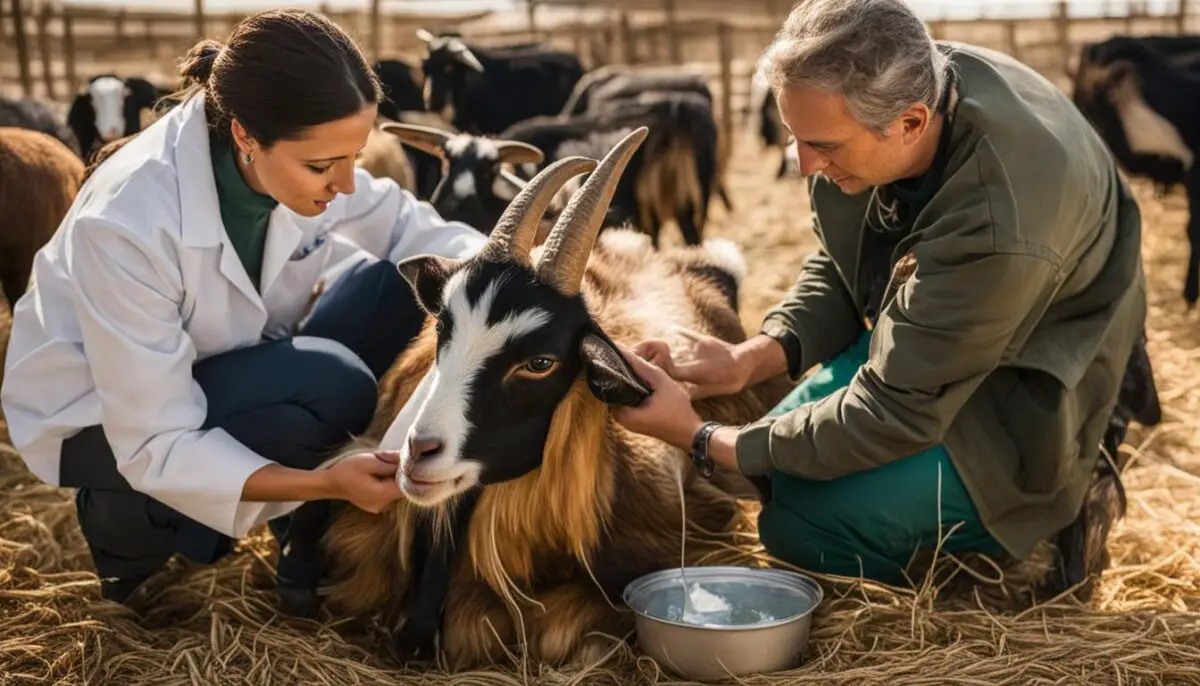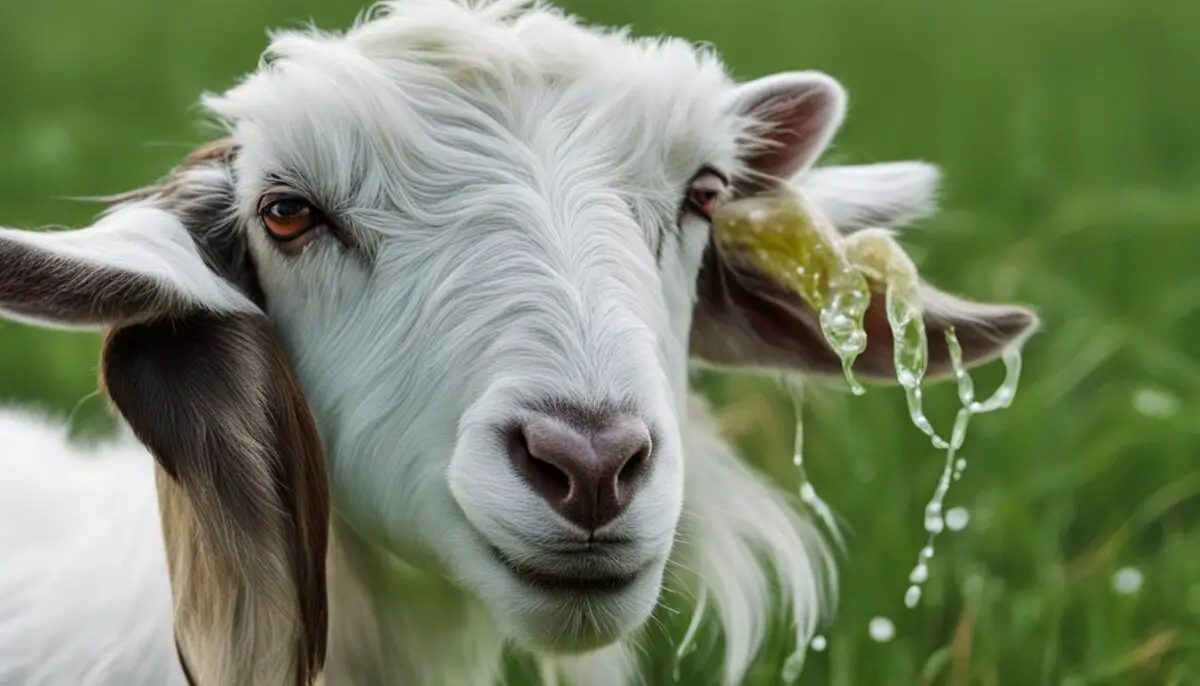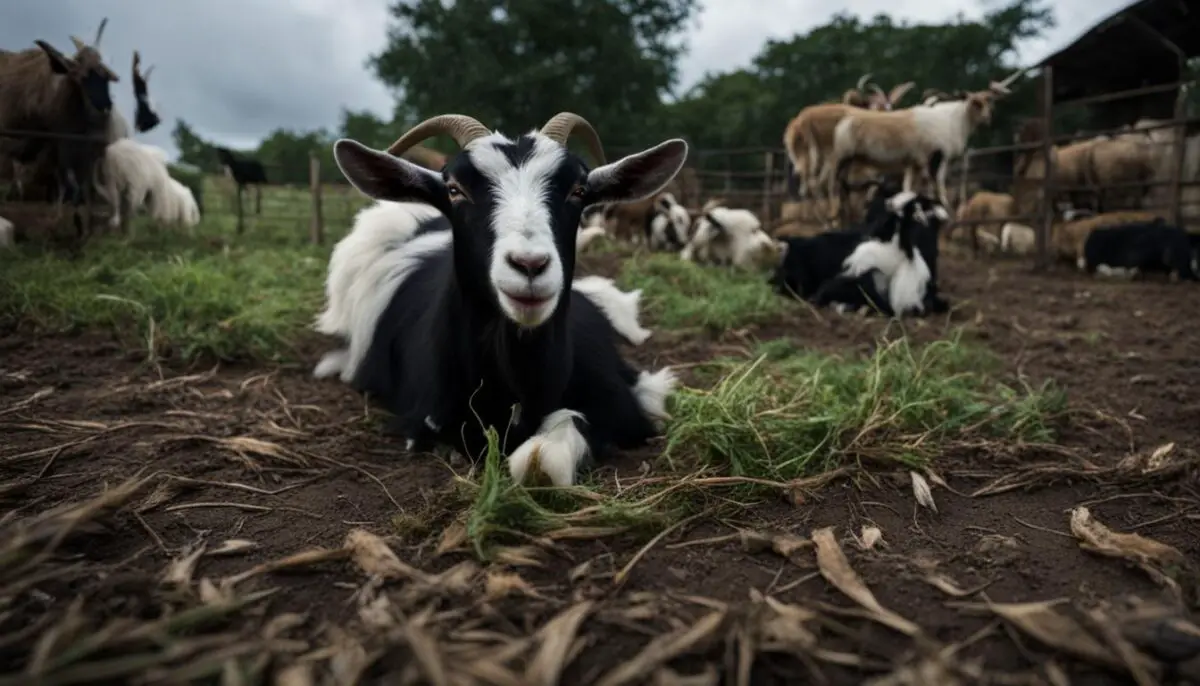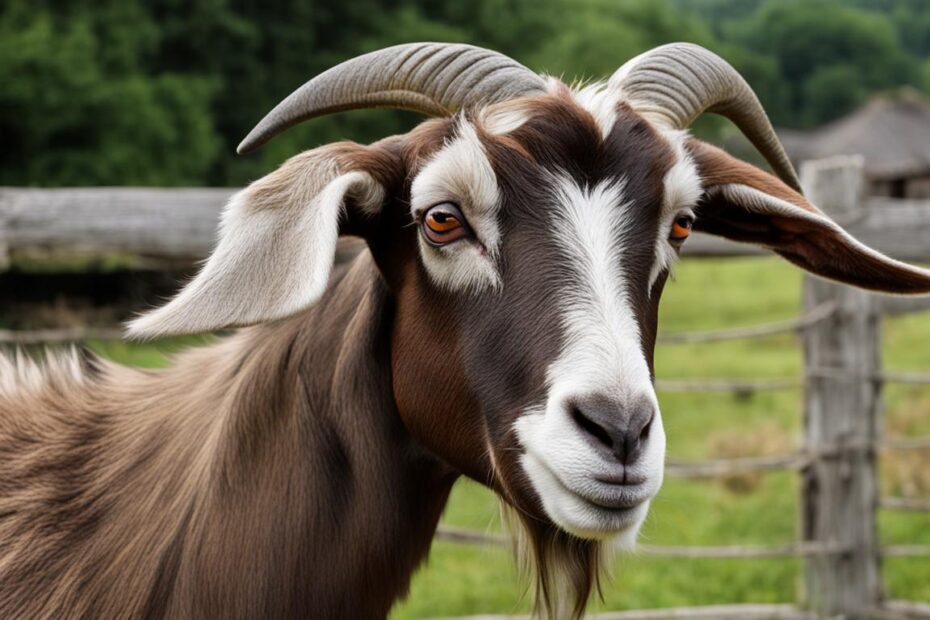When it comes to goat health, it’s crucial to stay vigilant and be aware of potential diseases and symptoms. One concerning issue that goat owners should be familiar with is a goat with foamy mouth. Foaming at the mouth of a goat can be an indication of a serious condition, such as bloat, that requires immediate attention.
Goats, as ruminant animals, ferment vegetation in their rumens, and the gas produced is usually released through belching. However, when this process is disrupted, it can lead to bloat, which can quickly become life-threatening if not addressed promptly.
Recognizing the symptoms of bloat in goats is essential. These can include a lack of appetite, discomfort, abdominal inflation, facial muscle tension, grinding teeth, frequent urination, and difficulty breathing. Frothy bloat, a type of bloat caused by the fermentation of certain foods, is particularly common in goats.
Understanding the causes, signs, and treatment options for bloat, as well as other potential complications in goats, is crucial for effective goat care. By taking preventive measures and seeking timely veterinary assistance, you can ensure the well-being of your goats and protect them from serious health risks.
Key Takeaways:
- Foaming at the mouth in goats may indicate bloat, a serious digestive issue that requires immediate attention.
- Symptoms of bloat in goats include lack of appetite, discomfort, abdominal inflation, facial muscle tension, grinding teeth, frequent urination, and difficulty breathing.
- Frothy bloat, caused by the fermentation of certain foods, is a common form of bloat in goats.
- Treating bloat in goats may involve passing a stomach tube, seeking veterinary assistance, or piercing the rumen to release gas.
- Indigestion and other complications, such as acidosis, can arise from improper goat diets and require specific treatment.
Signs and Symptoms of Bloat in Goats
Bloat in goats can have noticeable signs and symptoms that help in early detection and prompt treatment. Recognizing these signs is crucial for goat owners to ensure the well-being of their animals. The following are the common signs and symptoms of bloat in goats:
- Round, distended belly: One of the visible signs of bloat in goats is a bloated or swollen abdomen. It may appear rounded and tight.
- Hollow sound when tapped: When tapped on the left flank, the abdomen of a goat with bloat may produce a hollow, drum-like sound.
- Discomfort and restlessness: Goats experiencing bloat may exhibit signs of discomfort, such as kicking their belly, grinding their teeth, and walking awkwardly.
- Bleating: Goats with bloat may vocalize more than usual, expressing their discomfort through bleating or moaning.
- Difficulty breathing: As bloat progresses, goats may have difficulty breathing, showing rapid or labored breathing.
- Lying down: In severe cases, goats with bloat may lie down and struggle to get up.
It’s important to note that these signs and symptoms can progress rapidly, and if left untreated, bloat can be fatal for goats.
Detailed Table: Signs and Symptoms of Bloat in Goats
| Signs and Symptoms | Description |
|---|---|
| Round, distended belly | A bloated or swollen abdomen that appears rounded and tight. |
| Hollow sound when tapped | Produces a hollow, drum-like sound when tapped on the left flank. |
| Discomfort and restlessness | Kicking belly, grinding teeth, and walking awkwardly. |
| Bleating | Vocalizing more than usual, expressing discomfort through bleating or moaning. |
| Difficulty breathing | Rapid or labored breathing as bloat progresses. |
| Lying down | Goats may lie down and struggle to get up in severe cases. |
Causes of Bloat in Goats
Bloat in goats can be caused by various factors, including frothy bloat, free gas bloat, choke, and overeating. Frothy bloat occurs when goats consume a large amount of rich food, such as legumes or wet grass, which leads to the production of a foamy slime that traps gas in the rumen. Free gas bloat can occur when there is an obstruction in the throat or esophagus, preventing gas from escaping. Choke, which occurs when a goat swallows a large object, can also lead to bloat. Overeating, especially of indigestible materials, can cause impaction and block the release of gas.
To understand the causes of bloat in goats, it is important to consider the different types of bloat and their underlying mechanisms. Frothy bloat, also known as “foam bloat,” is the most common form of bloat in goats. It occurs when certain foods, such as legumes and wet grass, ferment in the rumen, producing a frothy substance that traps gas and prevents its release. This leads to the distension of the rumen and the characteristic symptoms of bloat. Free gas bloat, on the other hand, occurs when there is an obstruction in the throat or esophagus that prevents the release of gas from the rumen. This can be caused by a foreign object, an injury, or a physiological problem. Choke, a condition in which a goat swallows a large object that gets stuck in the throat, can also lead to bloat if it obstructs the flow of gas in the rumen. Finally, overeating, especially of indigestible materials, can cause impaction in the rumen, leading to bloating and discomfort. Understanding these different causes of bloat is crucial for effective prevention and treatment.
| Type of Bloat | Cause |
|---|---|
| Frothy Bloat | Consumption of rich food (e.g. legumes, wet grass) leading to the production of foamy slime that traps gas |
| Free Gas Bloat | Obstruction in the throat or esophagus preventing gas release |
| Choke | Swallowing of a large object that obstructs gas flow in the rumen |
| Overeating | Consumption of indigestible materials causing impaction and blockage of gas release |
Preventing bloat in goats involves implementing proper feeding practices and ensuring a balanced diet. Providing goats with a suitable forage, such as hay or pasture, and gradually introducing new foods can help prevent frothy bloat caused by the fermentation of certain foods. Avoiding overeating and the consumption of indigestible materials is also important to prevent impaction and blockage of gas release. Additionally, ensuring a safe environment free of objects that goats could potentially choke on can help prevent choke-related bloat. By understanding the causes of bloat in goats and taking preventive measures, goat owners can promote the overall health and well-being of their animals.
Treating Bloat in Goats
When a goat is experiencing bloat, immediate action is required to relieve gas and prevent further complications. One possible treatment is passing a stomach tube, which involves inserting a tube into the goat’s esophagus to release the trapped gas. This procedure should only be performed by a trained individual to avoid injury to the goat. If passing a stomach tube is not successful or is not an option, veterinary assistance should be sought.
In severe cases of bloat, where the goat’s condition deteriorates rapidly, it may be necessary to pierce the rumen to release the gas. This procedure, known as rumenotomy, should only be performed by a veterinarian. It involves making an incision in the goat’s left flank and extricating the gas from the rumen. This intervention is reserved for extreme cases where other treatment options have failed to provide relief.
Frothy bloat, which is a common form of bloat in goats, requires a specific treatment approach. Introducing a product that breaks down the foam and promotes the release of gas can help alleviate the symptoms of frothy bloat. These products are available commercially and should be administered according to the manufacturer’s instructions.

Treatment Options for Bloat in Goats
| Treatment Method | Description |
|---|---|
| Passing a Stomach Tube | Inserting a tube into the goat’s esophagus to release trapped gas. |
| Piercing the Rumen (Rumenotomy) | Making an incision in the goat’s left flank to release gas from the rumen. |
| Frothy Bloat Treatment | Introducing a product that breaks down the foam and promotes gas release. |
Immediate action is crucial when treating bloat in goats. Passing a stomach tube or seeking veterinary assistance should be the first course of action. In severe cases, rumenotomy may be necessary. Frothy bloat, a common form of bloat in goats, requires specialized treatment with products that break down the foam.
Indigestion and Other Complications in Goats
Indigestion can pose various complications for goats, affecting their overall health and well-being. Goats have a unique digestive system that is sensitive to imbalances and improper feeding practices. Understanding the causes and consequences of indigestion is crucial for goat owners to ensure the proper care and management of their animals.
Goat Acidosis and the Digestive System
One common complication of indigestion in goats is the development of goat acidosis. Acidosis is a metabolic disorder that affects the rumen, the largest part of the goat’s digestive system. It occurs when goats consume large quantities of grain too quickly, leading to an imbalance in the pH levels of the rumen. This disruption can result in decreased appetite, pasty droppings, and a variety of other health issues.
When goats consume excess grain, fermentation in the rumen produces high levels of lactic acid. This acid build-up disrupts the normal microbial population in the rumen, hindering proper digestion and nutrient absorption. Acidosis can also lead to a decrease in rumen contractions, further exacerbating indigestion.
Complications of Indigestion
Indigestion in goats can have severe consequences if left untreated. The accumulation of undigested feed and gas in the rumen can cause bloating, discomfort, and pain. In more severe cases, it can lead to rumenitis, an inflammation of the rumen wall, which can result in infection and abscess formation. Additionally, indigestion can disrupt the goat’s overall nutritional balance, leading to deficiencies in essential vitamins and minerals.
Antacids for Goats: Managing Indigestion
When faced with indigestion in goats, timely intervention is crucial to prevent further complications. In mild cases, grass hay and antacids can help restore rumen pH and alleviate symptoms. Antacids, such as sodium bicarbonate or calcium carbonate, can help neutralize excess acid in the rumen and restore a healthy balance. However, it is essential to consult with a veterinarian to determine the appropriate dosage and administration method for antacids.
For more severe cases of indigestion and acidosis, veterinary assistance may be necessary. A veterinarian can provide additional treatments and supportive care, such as rumen lavage or fluid therapy, to restore the goat’s digestive health. Additionally, implementing proper feeding practices, such as gradual diet transitions and providing a balanced diet, can help prevent indigestion in goats.
| Complications of Indigestion in Goats | Symptoms |
|---|---|
| Rumenitis | Inflammation of the rumen wall, leading to infection and abscess formation |
| Bloating | Accumulation of undigested feed and gas in the rumen, causing discomfort and pain |
| Nutritional Imbalance | Deficiencies in essential vitamins and minerals due to disrupted digestion |
Prevention of Bloat in Goats
To prevent bloat in goats, it is essential to focus on their diet, suitable forage, and feeding practices. Bloat, a serious digestive issue in goats, can be avoided by following a few key guidelines. Providing a balanced diet and creating a safe environment are crucial for maintaining the health and well-being of goats.
Diet and Suitable Forage
Goats’ diets should consist of at least 75% long-fiber forage, such as hay or pasture. This ensures proper rumen function and prevents the accumulation of gas. Concentrates, including grains and high-carb feeds, should be given in small quantities and in moderation. Avoiding rapid changes in the diet and introducing new foods gradually can help prevent digestive disturbances.
Feeding Practices
In addition to a suitable diet, proper feeding practices play a significant role in preventing bloat. Feeding goats on elevated platforms or using troughs with dividers can help slow down their eating habits, reducing the risk of overeating and the formation of gas. Regular monitoring of feed intake and observing any signs of discomfort or abnormal behavior can help identify and address potential issues early on.
Hay for Goats
Hay is an essential component of a goat’s diet and can contribute to preventing bloat. Providing clean and good-quality hay, free from dust, mold, and weeds, is crucial. Additionally, offering a variety of plant species in the pasture can ensure balanced nutrition and help prevent diet-related digestive problems.
| Prevention Tips | Key Benefits |
|---|---|
| Provide at least 75% long-fiber forage in the diet | Ensures proper rumen function and reduces the risk of bloating |
| Introduce new foods gradually to prevent digestive disturbances | Allows the goat’s digestive system to adjust and prevents gas formation |
| Feed concentrates in small quantities and in moderation | Reduces the risk of overeating and the formation of gas |
| Feed goats on elevated platforms or using troughs with dividers | Slows down eating habits and reduces the risk of overeating |
| Provide clean and good-quality hay free from dust, mold, and weeds | Ensures a healthy and nutritious diet, reducing the risk of digestive problems |
Causes of Foaming at the Mouth in Goats
Foaming at the mouth in goats can be attributed to various factors, including vitamin deficiencies, such as thiamine deficiency, which affects the neuromuscular system and can lead to neurological symptoms. It is important to ensure that goats receive a balanced diet that includes adequate levels of essential vitamins and minerals to prevent deficiencies.
Tympania, which is the swelling of the rumen due to fermentation of accumulated food, can also cause foaming at the mouth in goats. This can occur when goats consume large quantities of food too quickly, leading to an excess buildup of gas in the rumen. Proper feeding practices, such as providing smaller and more frequent meals, can help prevent this condition.
In kids, foaming at the mouth can be a result of dyspepsia, which refers to an upset gastrointestinal tract. This can be caused by various factors, such as sudden changes in diet or consuming spoiled or contaminated feed. It is important to monitor the health and well-being of young goats and provide them with appropriate nutrition and a clean environment to avoid digestive issues.
Overall, foaming at the mouth in goats can be a sign of underlying health conditions or improper feeding practices. It is essential to address the root cause of the issue and provide appropriate treatment and management to ensure the well-being of the animals.

Possible Causes of Foaming at the Mouth in Goats:
- Vitamin deficiencies, such as thiamine deficiency
- Tympania (swelling of the rumen due to fermentation)
- Dyspepsia (upset gastrointestinal tract) in kids
Prevention and Management:
To prevent foaming at the mouth in goats, it is crucial to provide a balanced diet that meets their nutritional needs, including essential vitamins and minerals. Feeding practices should focus on smaller, more frequent meals to prevent overeating and excessive gas buildup in the rumen. Monitoring the health of young goats and ensuring a clean environment can help prevent digestive issues and foaming at the mouth.
Treatment:
Proper treatment for foaming at the mouth in goats depends on the underlying cause. Thiamine deficiency can be addressed through the administration of thiamine hydrochloric acid, while dyspepsia may require supportive care and management of the gastrointestinal tract. In cases of rumen swelling (tympania), prompt veterinary attention may be necessary to relieve the pressure and restore normal digestive function.
Treatment for Foaming at the Mouth in Goats
When it comes to treating foaming at the mouth in goats, several options are available depending on the underlying cause. One common treatment is the use of thiamine hydrochloric acid, which can be administered to goats intravenously or intramuscularly. Thiamine deficiency is a possible cause of foaming at the mouth, and supplementing with this vitamin can help alleviate the symptoms.
Alternatively, oral medication can be used as a treatment for foaming at the mouth in goats. Natural remedies such as sunflower oil and vodka, activated carbon, and ammonia solution have been known to provide relief. These remedies can be administered according to appropriate dosage guidelines.
Additionally, massage and exercise can be beneficial in treating foaming at the mouth in goats. Gentle massage of the belly can help stimulate digestion and relieve discomfort. Encouraging the goat to move around and adopt an upright position can also aid in the release of trapped gas and promote overall gastrointestinal health.

Conclusion
In conclusion, proper care and attention to goat health are essential in preventing and managing foamy mouth and bloat in goats. By maintaining a balanced diet, providing suitable forage, and monitoring for any signs of digestive issues, goat owners can ensure the well-being of their animals. It is crucial to seek prompt treatment and veterinary assistance if symptoms of foaming at the mouth or bloat occur.
Remember, prevention is key when it comes to goat health. By following preventive measures such as feeding a proper diet, gradually introducing new foods, and providing a variety of plants in the pasture, the risk of bloat can be significantly reduced. Regular observation of goats and quick action in case of any abnormalities are vital to their overall health.
Take the necessary steps to keep your goats healthy and happy. Enjoy the companionship of these wonderful animals while being vigilant about their care. By prioritizing goat health and implementing preventive measures, you can ensure their well-being and prevent serious complications.
FAQ
What are the signs and symptoms of bloat in goats?
The signs and symptoms of bloat in goats include lack of appetite, discomfort, abdomen inflation, facial muscle tension, grinding teeth, frequent urination, and difficulty breathing.
What causes bloat in goats?
Bloat in goats can be caused by various factors, including frothy bloat, free gas bloat, choke, and overeating.
How is bloat in goats treated?
Treatment for bloat in goats can involve passing a stomach tube to relieve gas, seeking veterinary assistance, or piercing the rumen in severe cases. Frothy bloat can be treated by introducing a product to break down the foam.
What are the potential dangers of foaming at the mouth in goats?
Foaming at the mouth in goats can indicate underlying health issues and can lead to neurological complications, such as convulsions and loss of coordination. It can also be a symptom of liver damage caused by tapeworms.
How can bloat in goats be prevented?
Bloat in goats can be prevented by providing a suitable diet with at least 75% long-fiber forage, introducing new foods gradually, and feeding grains and high-carb feeds in moderation.


